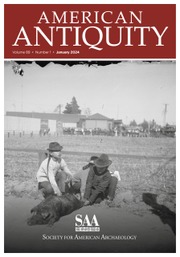Article contents
A Second Drilled Tooth from Prehistoric Western North America
Published online by Cambridge University Press: 20 January 2017
Abstract
The burial of a young adult woman with a drilled molar tooth was excavated in 1965 in northern Arizona (Museum of Northern Arizona NA9099.B5; Pueblo IV, A.D. 1300–1600). The drilling angle and location suggest that the therapeutic or palliative procedure was done while the woman was alive, and probably in pain because the drilled hole occurred at the bottom of a large necrotic cavity involving about one quarter of the occlusal surface. The drilled hole exited at the crown-root junction near a small alveolar buccal abscess. With painful and unhealthy dental caries on the rise as dependency on agriculture increased through time, it is suggested that this case and one other mark the beginning practice of primitive technical dentistry in prehistoric western North America.
Resumen
En 1965 se excavó en el norte de Arizona el entierro de una mujer adulta joven quien tínia un molar taladrado (Museo de Arizona del Norte NA9099.B5; Pueblo IV, 1300–1600 d.C). El ángulo de taladrado y su ubicación pareceráan indicar que se había realizado un procedimiento terapéutico o paliativo cuando la mujer estaba viva, quien probablemente sufrió dolor ya que el hoyo taladrado se encuentra en la parte inferior de una cavidad necrótica grande que abarca cerca de una cuarta parte de la superficie de oclusión. La salida de la perforación se encuentra en la unión entre la raíz y la corona cerca de un pequeño absceso alveolar bucal. Al incrementarse la dependencia en la agricultura a través del tiempo los individuos debieron sufrir dolorosas y antihigiénicas caries, por lo que se plantea que este caso y otro adicional evidencian el inicio de una técnica odontológica primitiva en el oeste de Norteamérica.
- Type
- Reports
- Information
- Copyright
- Copyright © The Society for American Archaeology 2004
References
References Cited
- 3
- Cited by


